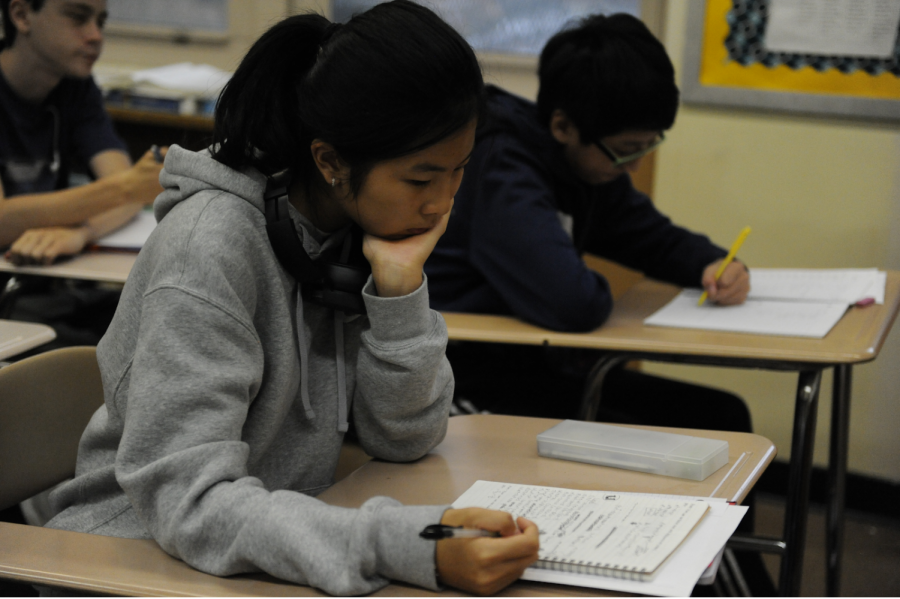Are Introverts Being Penalized by the American School System?
Blanche Lin ’22 finishes her classwork in her Algebra 2 class.
“Humans are very complex and their behaviors and preferences change over time and in different contexts,” said biology teacher Mr. Chomet. I believe that you cannot categorize people into perfect, little boxes and expect them to thrive. In this article, I will be exploring the opinions of Bronx Science students on participation grading, and how they believe their personality (whether they identify as introverts or extroverts) affects this.
While some students flourish under the pressures associated with collegiate success, others have a bit more trouble doing so. Participation is a very popular topic among the Bronx Science community, as everyone has their own opinion. Arifa Tasmiya ’22 said, “The students who look extroverted get called on more often than the more introverted ones, which makes it unfair to the quiet and shy ones.” This statement resonates with a large portion of the student body who believe that participation grading is biased. I believe that it is very discriminatory to grade someone in an area in which their personality plays a big role. If a student is uncomfortable with speaking in front of the class, they should not be penalized for it, as they cannot control who they are. Tasmiya continued, “This is unfair because introverted students are just as smart as the extroverted students are, but are more likely to feel uncomfortable in social situations where they are forced to share out loud.”
“The students who look extroverted get called on more often than the more introverted ones, which makes it unfair to the quiet and shy ones,” said Arifa Tasmiya ’22.
Even teachers, who are the reason for the controversy, contributed to this debate. Mr. Chomet said, “Many classroom tasks that I plan for my students favor different preferences. Whole class discussion favor the extrovert; individual reading/writing time and small group projects favor the introvert.” He even stated that he lowers the participation grades of his students who aren’t participating as much as others so as “to incentivise taking risks and contributing to the class discussion.” To involve more students in class discussions, many teachers have been using similar grading policies and techniques.
It is important to voice the opinions of people from both sides of the argument. For instance, Meena Shikes ’22 said that “classes shouldn’t just evaluate how well students do on tests; there should be other factors to assess [them]. A student’s ability to interact with others is important in life. It can help with public speaking because inevitably, people must interact with [others] in college, work, etc. One can view this situation as quality (in-depth thoughts) over quantity (the amount of times someone has expressed their opinions in public).” Another student, Khateja Shazad ’22, said, “It depends on the teacher and their grading policy on participation. Some teachers solely base their grades off of how often a student participates in class but most actually base their grades off of how active you work in class. I believe sometimes it’s okay to be graded heavily on participation because some classes are based on discussion.”
While participating in class discussions can be beneficial to a student’s understanding and comprehension of a topic, talking out loud in front of thirty-three peers and a teacher can be difficult for some students.
Arianne Browne is an Editor-in-Chief for ‘The Science Survey,’ a position she’s dreamed of ever since she was a child. Writing has been her passion...
Nabeeha Alam is a Chief Graphic Designer for ‘The Observatory’ yearbook. She enjoys taking and analyzing journalistic photographs, as they capture...

